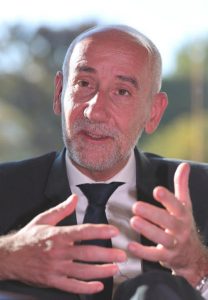Hiroshima Summit 2023: Interview with Jean-Eric Paquet, EU Ambassador-Designate to Japan—Significance in communicating Hiroshima’s message
Nov. 17, 2022
Uphold integrity of NPT
by Michiko Tanaka, Senior Staff Writer
Jean-Eric Paquet, Ambassador-Designate of the European Union (EU) to Japan, agreed to an interview with the Chugoku Shimbun in Tokyo regarding the situation in Ukraine and the summit meeting of the G7 (attended by the Group of Seven industrialized nations), to be held in Hiroshima next May, in 2023. Amid Russia’s continued escalation of threats to use nuclear weapons, Mr. Paquet remarked on how significant it would be for the G7 leaders to communicate Hiroshima’s message of “Never again.”
What work will you engage in as ambassador?
The relationship between Japan and the EU is becoming increasingly important under the current tense international situation. There is war in Europe, there are tensions over the Taiwan Strait in the Indo-Pacific region, and North Korea continues to launch its missiles. Japan and the EU are like-minded strategic partners. I would like to contribute to the strengthening of the ties between the two.
The viewpoint of economic security is also crucial. For instance, Europe has been reliant on Russia for its gas supplies. Fuel prices have thus skyrocketed, and consumers are forced to pay the higher prices. Imbalances also exist in the supply chain involving semiconductors and other goods. Japan faces the same issues and, as a result, the two sides should be able to engage in cooperation with each other.
What is your view of the situation in Ukraine?
Russia’s actions threaten the world order that humanity has created over this time as well as the rules of the United Nations. Because they also have shaken energy and food security across the world, that nation’s actions are absolutely unacceptable.
The EU is determined to continue its support of Ukraine as long as necessary. In June, the EU decided to accept Ukraine as an official candidate for membership in an exceptionally short space of time, about four months after the country applied. This was an important first step and a historic decision in terms of showing solidarity with Ukraine.
What are your thoughts about the decision to hold the G7 summit in Hiroshima?
It was a remarkable choice, precisely because President Putin is now threatening the world with the use of nuclear weapons. I have not yet been able to visit Hiroshima, but the city rebuilt itself after suffering destruction that staggered human imagination and, since the end of World War II, it has communicated the message that there should be “No more Hiroshimas.” That is an important message for humanity, and it will be significant for G7 leaders to reiterate that idea. At that time, I hope to visit the Hiroshima Peace Memorial Museum and speak with A-bomb survivors and other members of the public.
The EU includes nuclear weapons states and countries in whose territory U.S. nuclear weapons are deployed. Do you support the idea of a “world without nuclear weapons”?
That idea forms the heart of the Nuclear Non-Proliferation Treaty (NPT), and as such, I naturally support it. Now that Russia is shaking the very foundation of the NPT regime, the only way to approach that goal is to uphold the integrity of the treaty. However, as EU Ambassador to Japan, I might not be the appropriate person to comment on self-defense that is based on nuclear weapons. That is probably a matter for the North Atlantic Treaty Organization (NATO) military alliance.
What other issues would you like to see discussed at the upcoming Hiroshima Summit?
Climate change is another pressing issue that poses a threat to humanity. To achieve the Paris Agreement’s goal of limiting global temperature increases to 1.5 degrees Celsius above pre-industrial levels, each country must take immediate action to reduce greenhouse gas emissions. The G7 must lead the way in that effort.
Jean-Eric Paquet
Born in Paris in 1966, Mr. Paquet has worked for the EU since 2003. After serving in the posts of Deputy Secretary General of the European Commission and Director General for Research and Innovation, Mr. Paquet assumed his current post in September 2022.
(Originally published on November 17, 2022)








